ASX surges 1.9pc to enter new bull market
The local market has capped a strong session at five-week highs, marking a move into a bull market after just 14 days.

- Shares enter new bull market
- Confidence, conditions crash to record low
- $A surges to five-week high
- QBE halted for capital raise
- Westpac flags earnings hit
That’s it for the Trading Day blog for Tuesday, April 14. The ASX reversed early losses to notch a 1.9pc lift, marking a move into a bull market after just 14 trading days. Banks were the key drag after Westpac warned of a $1.4bn hit from Austrac costs, though even financials ended in the green. All eyes were on Virgin, who this morning re-entered a trading halt as it asked for government assistance. QBE and InvoCare halted shares as they tapped the market for equity.
It comes after overnight falls on Wall Street, where indexes pared last week’s strong gains ahead of earnings reports, which will shed more light on the hit from coronavirus.
4.41pm: All eyes turn to US earnings
Today’s local strength come ahead of the start of earnings season in the US, tipped to set the tone for markets in the week ahead.
“The markets are taking a collective breath-in today, as US earnings season kicks off for the quarter. EPS is expected to contract by -10 per cent this quarter. But the key point will be about guidance for US equities,” IG Markets analyst Kyle Rodda said.
“The market is so clearly pricing-in a V-shaped recovery to company profits, premised primarily on a US economy that reopens within the next couple of months, at the latest.
“If US companies flag doubts about this timeline, or suggest the economy won’t rebound with the gusto expected, that may be the impetus for equity markets to, at the least, pause this recent upswing in price.”
Here’s the biggest movers in the local session:
4.12pm: Shares enter new bull market
The local market brushed off a weak open to hit five-week highs on Tuesday, capping one of the benchmark’s shortest bear markets on record.
A weak lead from Wall Street prompted a 0.5 per cent slip on the benchmark ASX200 early as major banks dialled back, but reversal in sentiment spurred a rally through the afternoon session to cap the day at its highs of 5488.1 – up 101 points or 1.87 per cent.
At these closing levels, the ASX200 is 20.7 per cent higher than its March 23 closing low of 4546.
3.54pm: Shares closing in on end of bear
Australia’s sharemarket is on track to end the recent bear market and enter a bull market after a similar move in the S&P 500 last week.
The S&P/ASX 200 is up 1.9pc at a 4-week high of 5490.7 points in late trading as S&P 500 futures gain 1.6pc in Asian trading.
The Australian market needs a daily close of at least 5455.24 to start a new bull market defined as a rise of at least 20 per cent from the low on a daily close basis.
Anything can happen in the closing match these days, but it seems as though fund managers don’t want to be caught without shares if it’s back in a bull market.
This looks very much like a FOMO – fear of missing out rally – even if investors face a reality check from US earnings reports and economic data this week.
At just 16 day since the it bottomed on March 23, this will be one of the fastest moves off a bull market low for the ASX.
The Aussie market $XJO is in both a "technical" bull AND bear market. It's up 25% since the low this year on 23 Mar 2020 but down 23% since the all time high on 20 Feb 2020. I guess that's the problem with defining markets by +/-20% movements 🤷â€â™€ï¸ðŸ¤·â€â™‚ï¸ðŸ¤· pic.twitter.com/4AbXVbN6Lg
— Julia Lee (@JuliaLeeAU) April 14, 2020
Lilly Vitorovich 3.25pm: News Corp gains on digital surge
News Corp shares gain 1 per cent to $14.99 after the media group reported a surge in digital news subscriptions and warned the coronavirus crisis could have a material impact on its global operations.
In a trading update, the publisher and broadcaster said it would push ahead with cost cutting, as advertising drops off and the cancellation of sports hurts its pay-television and streaming businesses, Foxtel and Kayo Sports.
News Corp, the publisher of The Australian, is the latest media company to warn of a hit to advertising as the COVID-19 pandemic has triggered lockdowns to stop its spread which has caused the economy to stall.
3.20pm: Intraday bank reversal drives gains
A big intraday rebound in banks has also helped turn the ASX200 from down 0.5pc to up 1.2pc today
Westpac’s $1.43bn writedown slammed the banks initially with Westpac down 2.2pc, ANZ down 2.8pc, CBA down 1.7pc, NAB down 1.5pc and Macquarie down 2.7pc in early trading.
But Westpac is up 1pc, ANZ is up 0.8pc, CBA is up 0.5pc, NAB is up 2.2pc and Macquarie is up 0.6pc in late afternoon trading.
3.17pm: US slowdown may force Transurban raise: Macq
Transurban may be forced to inject capital or seek debt covenant waivers for its private activity bonds as US road traffic tumbles amid the COVID-19 shutdown, Macquarie said.
US roads face volume declines of 70 to 80 per cent along with price falls and an extended shutdown similar to Europe would see covenant ratios get pressured. Transurban is due to release its quarterly traffic data on Thursday.
“US assets have added price pressure,” Macquarie said. “It remains the length of the shutdown that may require Transurban to seek debt covenant waivers for the private activity bonds, or possibly inject capital. With recent liquidity enhanced, Transurban is in a good position to manage this risk.”
Transurban operates three roads in Washington and one in Canada’s Montreal. Traffic plummeted 65 per cent in the last week of March at its North American network.
The company has $3.5bn of funds available from April this year to the end of the 2021 financial year with $2.9bn committed through capital spending or debt refinancing. It raised an extra €600m ($1.08bn) in the European bond market on April 2.
Transurban up 2.4 per cent to $12.58 at 3pm Tuesday.
3.04pm: a2 Milk hits fresh record high
Shares in a2 Milk are surging to fresh record highs in afternoon trade, bucking broader pessimism in the market and shaking off recent weakness.
The infant milk formula stock is today trading up 3.2 per cent at $17.35 apiece – after touching as much as $17.54 in early trade.
2.55pm: Shares extend rally to 5-week high
Not even the worst business confidence on record can stop the Australian sharemarket.
The S&P/ASX 200 hit a new 5-week high of 5450.7 in midafternoon trading, up as much as 1.2pc today.
The Australian benchmark is just a few points away from the 5455.24 daily close needed to end the bear market and start a new bull market, however long that lasts.
Global markets US futures have gone from strength to strength with S&P 500 futures up 1.6pc, Japan’s Nikkei 225 up 2.8pc, South Korea’s KOSPI up 2pc and Singapore’s FTSE Straits Times index up 2.5pc.
Positive thoughts on oil explain some of the strength as Brent crude rises 1.5pc, leading the Norwegian Krone up 0.9pc and the S&P/ASX 200 Energy sector up 0.7pc.
But the biggest factors appear to be falling daily growth in coronavirus infections and the renewed push by US leaders including Donald Trump to restart the US economy.
Still, US earnings reports and economic data this week will provide a stark reminder of how much damage is being done to the global economy and it’s unlikely to end here.
2.50pm: Dongfeng restructures Renault merger
Dongfeng Motor Group said it has agreed to restructure its joint venture with French car maker Renault SA, due to the downturn in China’s car market and the unit’s weak operations.
According to the nonbinding agreement, Renault will transfer its 50pc stake in the JV, Dongfeng Renault car, to Dongfeng Motor, the Chinese company said Tuesday.
After the restructuring, the joint venture, founded in 2013, will cease to engage in any businesses related to the Renault brand.
Dongfeng said it would continue other cooperations, such as new engine and electric car development, with Renault through Nissan, a strategic partner of the French car marker.
In 2019, the joint venture made a pretax loss, and contributed to a mere 0.5pc of Dongfeng’s total sales, the parent company said.
Dow Jones Newswires
Bridget Carter 2.41pm: Virgin rescue to involve convertible note
DataRoom | Virgin Australia’s proposed restructure is understood to involve a convertible note offered by the federal government that will convert to equity if the airline breaches its debt covenant.
It comes as the airline remains in a trading halt pending an announcement.
Terms of the deal were said to be announced by Wednesday evening and it is understood to involve both lenders and equity holders taking a haircut if the covenants are breached.
It is believed that whether the restructure takes the form of a Creditor’s Scheme of Arrangement or a Deed of Company Arrangement is to be finalised.
Should the plan for a government loan gain approval, as expected, Virgin will receive funding worth about $1.4bn from the government in total, including the money collectively made available to the airline industry.
Read more: Options brewing for virgin rescue plan
2.12pm: CSL price ignores virus risk: MS
Morgan Stanley have tipped CSL shares to fall in the next 30 days, saying the stock’s trading price reflects no or minimal risk from the coronavirus pandemic.
In a research tactical idea, analyst Sean Laaman rates CSL at equal-weight with a price target of $288.
He notes that the stock has traded up recently, “making short term valuation much less compelling”.
“CSL’s share price reflects no/minimal risk from the COVID-19 pandemic, yet we see a reduction in raw material (plasma) collection (owing to social distancing measures) leading to EPS lower than the Street expects in FY21.”
CSL last traded down 1.2pc at $325.02.
1.54pm: Supermarket sales growth to slow: Citi
The boost to supermarket sales from stockpiling is only short-lived, with sales growth to settle back to just 4pc in April, according to Citi.
Retail analyst Craig Woolford notes that after the sales surge in March, investor focus is now on how much was temporary lift and what incremental margin the retailers achieve on sales.
He estimates the move from out-of-home food to supermarket shopping will add around $6bn to $7bn to the sector but warns that more cautious shoppers buying smaller packets and private label items could dag 5pc from growth.
“Fewer promotions has likely helped gross profit dollars in March and is an inflationary effect. We expect promotions to ramp back up in April and normalise over the coming months,” Mr Woolford says.
He maintains a neutral rating on both Coles and Metcash, saying sales growth could drop to 4pc in April and settle closer to 6pc beyond that.
Perry Williams 1.42pm: Boral will avoid equity raise: CS
Boral may avoid an equity raising after choosing to abandon a $US335m ($521m) payment for its USG Australian plasterboard joint venture with the company likely to remain free cash flow positive, Credit Suisse said.
Its original plasterboard venture with German giant Knauf was canned earlier Tuesday with the companies now working on a “cash neutral” deal that doesn’t involve any significant funding for Boral.
That move frees up a $US335m cash commitment required under the original deal with Knauf, easing pressure on its balance sheet. Boral said its $US400m acquisition bridge loan for the deal was allowed to lapse.
“In our view while debt remains high (negative ratings watch) and funds from operations to debt will fall below threshold levels in 2021 financial year, we think Boral will likely avoid an equity raise given it should remain free cash flow positive throughout, liquidity appears more than adequate and it likely will not test covenants,” Credit Suisse analyst Peter Wilson said. “A reduced equity component for USG Boral Australia should further improve this.”
Boral last up 2.7 per cent at $2.65.
Read more: Boral axes deal, slashes spending
1.11pm: Pioneer Credit halves as suitor attacks
Pioneer Credit suitor Carlyle Group has turned on the embattled debt collector, attempting to pull out of its scheme of arrangement and prompting a more than halving of its already-tattered share price.
Carlyle had injected debt into the business late last year, and was making steps to complete an agreed takeover but has backed out amid pressure from the economic slump.
In a double hit, Carlyle today said Pioneer had made several defaults against its syndicated facilities agreement, and also breached its scheme implementation agreement.
“It seems clear to the Board that Carlyle are intent on exercising maximum pressure on the Company, including using the potential impacts of COVID-19, to move from their original
commitment under the SIA and either withdraw from the transaction or attempt to gain control
of Pioneer for a very low price,” Pioneer said in a statement.
“The Company is generally disappointed with Carlyle’s actions and is considering this further
letter and its proposed response. Pioneer believes that it has engaged with Carlyle in good faith continuously throughout the period since the SIA was signed, providing extensive
information, analysis and data and has responded to all enquiries with vigour and detail.”
PNC shares last down 53pc to 29.5c.
1.02pm: Shares surge to four-week highs
The local market is surging as much as 1pc in lunch trading, looking through a collapse in business confidence and conditions to hit its best levels in four weeks.
At 1pm, the benchmark ASX200 is higher by 40 points or 0.74 per cent after earlier hitting 5442.7.
All sectors bar REITs are trading in the green, but tech is outperforming with a lift of 4.1 per cent.
It came as S&P 500 futures rose 1.3pc amid Trump’s renewed call for an early restart of the US economy, which has been backed by various state leaders.
If it closes at or above 5455.24 points, the S&P/ASX 200 will be back in a bull market along with the US.
Here’s the biggest movers at 1pm:
12.41pm: Bega wins peanut butter appeal
The federal court has upheld a judgment allowing Bega to maintain its peanut butter branding, after an appeal from US giant Kraft Heinz.
Bega won a case brought by Kraft in the Federal Court in May last year, giving it the rights to use the iconic yellow top and wraparound yellow dressing on its jars.
“This gives Bega Cheese the right to continue to use the current packaging of its Smooth and Crunchy Peanut Butter products,” it said in a brief note to the market.
“Bega Cheese looks forward to continuing to produce and supply our customers with our much-loved peanut butter products.”
Earlier this year, Bega reported a hit of $9.5m at its half-year earnings to fight legal battles relating to its peanut butter products.
BGA last traded up 3pc to $4.76.
Read more: Bega pays price for defending peanut butter
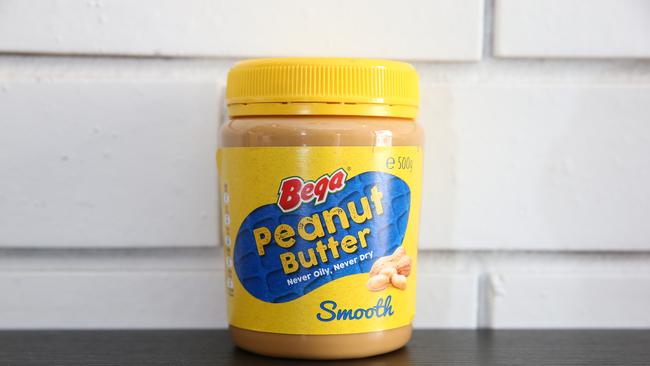
Bridget Carter 12.38pm: Seven West calls in debt experts
DataRoom| Seven West Media has drafted in advisory firm Grant Samuel to assist with discussions surrounding its debt levels.
Grant Samuel is understood to have a close relationship with the company’s chief financial officer Jeff Howard, who was appointed in December after working as the CFO at Here, There and Everywhere.
The Kerry Stokes-backed Seven West Media has a $96m-odd market value and $569.5m of net debt at December.
It also had almost $115m of cash and equivalents.
Sources said that Grant Samuel was working on debt modelling for the company and assisting with talks with its lenders.
12.28pm: Cellmid receives first COVID-19 tests
Aussie biotech Cellmid has confirmed the receipt of its first shipment of coronavirus testing kits, expected to be used to assist in return to work programs.
The group, whose shares soared 237 per cent late last month on reports its test could identify COVID-19 antibodies, today said 12,000 of the tests had arrived in Sydney.
“Cellmid expects the Wondfo point of care test to be largely used to facilitate return to work programs. The current shipment is intended to be sold to medical practitioners subject to the completion of internal testing,” it said.
The group added that it had received “several hundred enquiries” to supply the test to doctors, hospitals and research groups.
“The Company is currently evaluating these requests and will be completing confirmatory testing in reparation for placing its second order with the manufacturer.”
CDY shares last traded down 13.3pc to 26c.
Read more: Cellmid ‘breached’ disclosure rules: ASX
12.19pm: China data suggests recovery
China’s trade data have beaten estimates for March – imports rose 2.4pc year-on-year in yuan terms versus an expected 7pc fall.
Exports fell 3.5pc versus an expected 12.8pc fall.
It suggests China’s economy is recovering faster than expected after virus lockdowns.
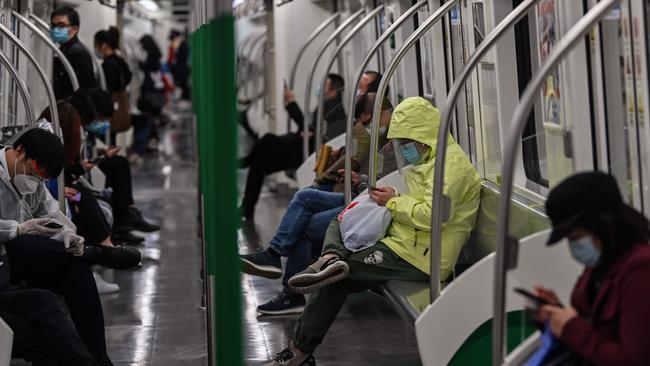
Nick Evans 12.15pm: Dacian crashes on return to trade
Dacian Gold shares have crashed on the company’s return to the market after an emergency capital raising, tumbling 96c to 44c in early trading.
But the price is still well above the 30c a share issue price of its $70m placement, run to give the company breathing space on its debts following a disastrous year for its Mt Morgan gold mining hub.
Dacian put itself on the auction block in June 2019 after a series of production downgrades but failed to find a buyer. It suspended trading in its shares in early February, citing the need to again review its mining plans and work out its capital requirements going forward.
When the company began construction of its Mt Morgan gold mining hub it said its Mt Morgan underground and open pit operations had the potential to produce 200,000 ounces of gold a year over a 10 year mine life.
That is now down to 110,000 ounces a year over a three year mine life, with Dacian planning to spend some of the proceeds of its raising on adding to its resource inventory through regional exploration.
Dacian is still conducting a $28m entitlement issue for retail shareholders, after closing a $30m placement to institutional investors late last week, along with a $40m institutional entitlement issue.
The company said it expects to finalise the retail portion of the raising, now fully underwritten, by early May.
11.51am: $A surges to five-week high
The Aussie dollar has shrugged off a horrific business confidence read, instead charging higher in morning trade to a five-week high.
AUDUSD is trading up 0.67 per cent to US64.23c just before noon, its best levels since March 12.
This has put the Aussie dollar near the top of the G10 leaderboard today behind the Norwegian Krone which is benefiting from modest gains in crude oil prices.
AUD/USD remains tied to the global risk appetite, which is benefiting from tentative plans by US states to start reopening soon
Patrick Commins 11.37am: NAB confidence, conditions off the charts
NAB’s monthly business survey has confirmed a sudden and calamitous collapse in corporate confidence and conditions in March, as large swathes of the economy were forced into hibernation to contain the spread of the deadly coronavirus.
“Business has essentially told us that trading conditions, profitability and employment all went backwards in a big way in the month,” NAB chief economist Alan Oster said.
The business confidence index dropped to -66 points – the lowest on record – from -2pts in February. Businesses said they were markedly more pessimistic than during the depths of the GFC – when the index reached -30pts – and the early 1990s recession, when it fell to -20pts.
Companies also reported a sharp decline in operating conditions, with the index falling to -20pts, consistent with the depth of the GFC, but still shy of the last recession, when the gauge dropped to -40pts.
Read more: Business confidence collapses
Nick Evans 11.29am: Sandfire wins US project approval
Shares in Sandfire Resources gained on Tuesday as the WA copper miner said it has finally won through the environmental permitting process for a key element of its Black Butte copper project in the US state of Montana.
Sandfire first bought into the project in 2014, acquiring a 36 per cent stake in Canadian-listed Tintina Resources and now owns 85 per cent of the copper deposit, which has an inventory of 10.9 million tonnes of ore grading 2.9 per cent copper.
Progress on winning approvals for the mine have been painfully slow since then, but Sandfire said on Tuesday it had finally won a positive record of decision from the Montana Department of Environmental Quality for a mine operating permit for the project.
Sandfire had been due to deliver final feasibility studies on the mine by the end of 2019 but said that, despite the key approval, said the release of the final numbers and a final investment decision could be delayed due to the coronavirus crisis.
RBC analyst Alexander Hislop said the approval was a “positive marker” for Sandfire to grow beyond its ageing DeGrussa copper mine in Western Australia, along with its Botswana copper project, acquired last year.
“Finalisation of the feasibility study — particularly the timing and magnitude of upfront capital requirements, as well as operating costs — will be important given the recent decline in copper prices and its potential impact on operating cash flow from DeGrussa. SFR maintains a strong balance sheet position at A$202m net cash,” he said in a client note on Tuesday.
Sandfire shares were up 17c, or 4.3 per cent, to $4.10 at 1100 AEST.
Jared Lynch 11.06am: Funeral restrictions prompt InvoCare raise
Australia’s biggest funeral home, Invocare, is delaying the payment of its final dividend while tapping the market to raise $150m as the number of people attending funerals plummet amid government-imposed restrictions to limit the spread of coronavirus.
While the number of funerals have remained unaffected by the COVID-19 pandemic, the spend per service has declined, following the government limiting mourners to 10 people at each funeral and stipulating they must keep at least four square metres apart as they farewell loved ones.
Despite the restrictions, Invocare says it has been able to mitigate damage to its balance sheet, reporting a revenue slide per service of less than 10 per cent.
“Our ability to offer a full range of services to our client families is being affected by the current restrictions issued by governments on social distancing in response to the COVID-19 outbreak,” chief executive Martin Earp said.
Read more: InvoCare raising $160m
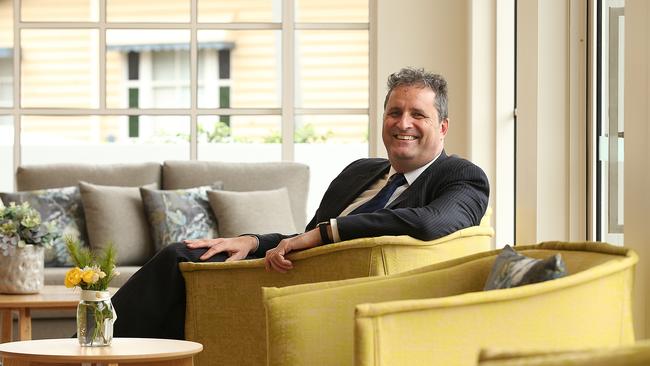
10.59am: Shares reverse early losses
Australia’s sharemarket is still very choppy to start the week, turning up by 0.6pc after an early 0.5pc fall.
Gold miners are accounting for much of the strength, with Newcrest up 8pc, Northern Star up 10pc and Evolution up 6.3pc.
Woolworths is also a solid contributor to strength with a 2pc gain, as are Afterpay, up 12pc and Rio Tinto, up 1.6pc.
Southern Cross Media is by far the strongest stock in the market, up 42pc, which just shows what can happen once companies recapitalise.
Perry Williams 10.55am: Boral cans Knauf deal, slashes spending
Building materials supplier Boral has canned its original plasterboard venture with Germany’s Knauf and slashed up to 20 per cent of planned spending this year as construction demand tanks due to the COVID-19 pandemic.
A long-awaited $US441m deal unveiled last August with Knauf will fail to be completed by a June 30 sunset date due to issues receiving regulatory approvals.
Boral had proposed paying $US200m for the remaining 50 per cent stake of USG Boral in Australia and $US241m for a half share of the Asian venture.
Under the deal, Knauf had a call option to buy the half stake back within five years for the Australian USG stake.
Boral had already flagged the Australian Competition and Consumer Commission was unlikely to approve the call option and said it was “now clear” it was not able to obtain a green light from regulators by the sunset date. Other unnamed conditions to the transaction also remain outstanding.
BLD last traded higher by 1.9pc to $2.63.
Read more: Boral axes Knauf deal, slashes spending
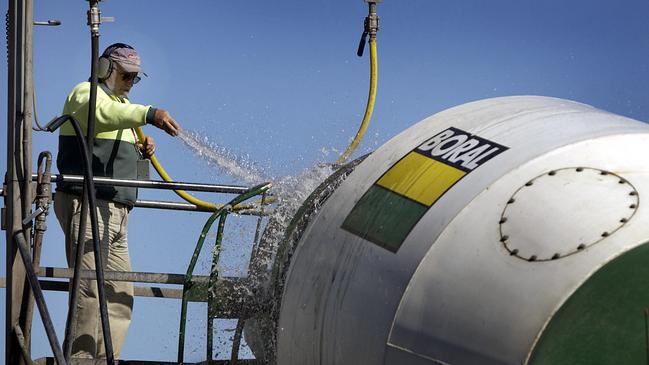
10.47am: Afterpay leads ASX gains
Interestingly, Afterpay is among the top gainers in the S&P/ASX 200 today, despite withdrawing its customer growth guidance.
Its shares are up 11pc at $2.36 after surging 19pc to 5-week high of $25.86.
In an update this morning, the company said it expected to exceed its FY22 underlying sales target of $20bn.
RBC’s Tim Piper keeps his Sector Perform rating and $34 target, saying Afterpay is “holding up well”.
“Today’s update showed Afterpay’s business continued to track well through 3Q20 until the effects of COVID-19 began to show an impact,” he says.
“That said, activity has not decreased significantly and Afterpay’s predominantly online position places them in a relatively good position, instore is however a key growth driver.”
He says the key is that liquidity has further strengthened, and Afterpay’s balance sheet is capitalised to withstand a material rise in loss rates in the near term if this was to eventuate.
“It’s still a bit early to get a good read on the impact to loss rates and net margins (but) we highlight changes Afterpay has made around its risk management decisions, low account balances and high receivables turnover as key advantages,” Mr Piper says.
10.27am: Banks tumble weighs on ASX
The major banks are leading the market lower, after Westpac’s $1.4bn writedown related to Austrac expenses.
Australia’s S&P/ASX 200 has extended its early falls to 0.5pc at 5401.4.
That’s as Westpac lost 1.8pc and ANZ fell 2.2pc, CBA fell 1pc and NAB slipped fell 0.9pc, while Macquarie lost 2.7pc.
Together with falls in Real Estate, Consumer Discretionary, Industrials, Energy, Industrials, Utilities and Health Care, the sell-off in banks certainly crimped what was expected to be a 4pc plus rise based on offshore gains.
And just for good measure, US stock index futures have turned down slightly, with S&P 500 futures down 0.2pc after recent massive gains in global sharemarkets.
10.12am: Shares fight to hold gains
Shares are fighting to stay positive in early trade, despite hopes of an early lift.
The benchmark ASX200 is trading flat at 5386.1 – after an early lift to as much as 5401.4.
Real estate and banking stocks are doing the most damage – especially Westpac as it trades down 1.1 per cent following warning its Austrac costs could be more than $1.4bn.
Afterpay is up 10pc after its quarterly update, and despite scrapping its customer growth targets, while CSL is down by 1.4pc on a downgrade from Citi.
Robyn Ironside 10.03am: Virgin halt to consider all options
A Virgin Australia spokesman said the trading halt was requested, as the company continued to consider ongoing issues with respect to financial assistance and restructuring alternatives.
“This has arisen due to the unprecedented COVID-19 crisis which has particularly impacted the aviation sector,” the spokesman said.
“We value the ongoing support of our customers.”
He said Virgin Australia had been keeping the “air fair” in Australia for 20 years and the company wanted to continue to provide a valuable service to all Australians.
The airline employed 16,000 people “directly and indirectly” and its continued operation would enable the broader economy to restart quickly once the crisis had eased, he said.
Durie | Whether @VirginAustralia emerges from its latest share trading halt is up in the air, with its best hope some government support. #ausbiz $VAH #auspol https://t.co/PWTbxWw34q
— Business Review (@aus_business) April 14, 2020
10.01am: CSL downgraded after outperformance: Citi
Citi’s John Deakin-Bell has cut CSL to Neutral on share price strength while tweaking his target price up $5 to $334.
He notes that CSL is the 3rd best performing stock in the ASX100 in the last quarter, and has outperformed the market by over 30pc.
Going forward, he sees some slowdown in plasma collection but expects it to be “transient” with collections likely returning to normal from around July 2020.
9.58am: ASX futures reopen sharply lower
S&P/ASX 200 futures fell sharply after reopening after the Easter break.
ASX200 futures were down 1.6pc at 53602 after opening at 5394.
This will take the edge off what’s expected to be a strong open for the Australian sharemarket.
Helpfully, the RBA has just added a net $1.56bn of liquidity in its daily money market operations.
John Durie 9.54am: Virgin halted for crisis talks
DataRoom | Virgin Australia went into a trading halt on Tuesday and whether it emerges is up in the air, with the best hope being some sort of federal government support.
Virgin chief executive Paul Scurrah spent the Easter weekend calling federal government ministers and opposition frontbenchers in a bid to secure support ahead of a cabinet meeting today that could decide the debt-heavy airline’s future.
It comes as the Morrison government comes under increasing pressure to help the airline stay afloat and maintain a competitive airline market for when the COVID-19 crisis lifts.
Read more: Virgin in halt amid rescue hopes
9.39am: 5-week high within reach for ASX
S&P/ASX 200 futures surged 4.3 per cent on Thursday night, suggesting the ASX200 will open at a 5-week high above 5600 points today.
While the S&P 500 fell 1pc while the Australian market was closed on Monday, S&P 500 futures are up about 0.2pc this morning.
Oil futures have consolidated since the supply cuts announced Monday, despite analyst doubt that the OPEC+ and G20 producer deal will stop a glut in the short term.
If the S&P/ASX 200 closes at or above 5455.24 points it will be back in a “bull market” after one of the shortest bear markets in history. But there are a number of reasons to expect the Australian sharemarket to top out soon after the open today.
The market has “priced out” a lot of bad news on the virus, which may be premature as countries that eased lockdowns have had to increase them.
The market has also priced in a lot of fiscal and monetary stimulus, though the local bourse will initially be catching up to the Fed’s additional QE plans for corporate credit announced Thursday.
But the economic and earnings damage is yet to come and will be highlighted this week as the US first quarter corporate earnings season kicks and Australian business and consumer confidence data are released.
Also in Australia, Westpac has just flagged a $1.43bn writedown, Healius has deferred its dividend, Afterpay has withdrawn its FY20 customer growth guidance, QBE is raising $825m, Invocare is raising $160m.
9.31am: What’s on the broker radar?
- CSL cut to Neutral – Citi
- Corporate Travel raised to Sector Perform – RBC
- G8 Education raised to Outperform – RBC
- Netwealth cut to Hold – Ord Minnett
Bridget Carter 9.25am: InvoCare halted for $160m raise
DataRoom | InvoCare has entered a trading halt as it raises $160m through Morgan Stanley.
The funeral company is offering shares at $10.40 each by way of an underwritten institutional placement and up to $50m through a share purchase plan.
The raise is at a 7.8 per cent discount to its last closing share price.
It takes its debt levels to 1.5 times its 2019 earnings before interest, tax, depreciation and amortisation.
The raise will strengthen the company’s balance sheet and help to accelerate growth.
Gerard Cockburn 9.12am: Afterpay withdraws customer growth guidance
Afterpay says coronavirus is having little impact on its underlying sales growth even as it scrapped its customer growth targets and recorded an increase in customer financial hardship claims from mid-March onwards.
The Australian buy now, pay later provider posted third quarter underlying sales of $2.6bn, a 97 per cent increase compared to $1.3bn in the same quarter last year.
Afterpay said average daily underlying sales in March were up approximately 12 per cent on January and February, but had moderated in the second half of the month in line with government-enforced lockdowns and isolation protocols.
As such, underlying sales in the second half versus the first was down 4pc – by region the UK was worst hit, down 15pc while the US was down 5pc and Australia and New Zealand by just 2pc.
Active customers on the platform grew to 8.4 million at the end of the third quarter, but the group said it was withdrawing its previously stated 9.5 million goal for June 30 given “the possibility that new customer growth may be further moderated if conditions worsen, and additional risk measures may be implemented in the coming months”.
It added that financial hardship claims had risen from mid-March, however Afterpay said the levels remain “manageable” and were now trending down.
“Early indicators demonstrate favourable payment trends for orders placed after Mid-March, potentially resulting from a shift to more responsible spending by customers, the impact of pre-emptive adjustments to risk settings and the introduction of government stimulus initiatives,” the company said.
APT last traded at $22.
Nick Evans 9.08am: Jupiter gets tick for partial restart
Jupiter Mines says it has won government approval for the partial restart of its South African manganese mines, despite last week’s extension of the country’s coronavirus lockdown until at least the end of April.
The Brian Gilbertson-chaired company’s Tshipi Borwa manganese mine has been closed since March 24, when the South African government imposed a mandatory 21 day lockdown in an attempt to halt the spread of COVID-19.
While the government last week extended that lockdown to the end of April, Jupiter said it had won permission for a partial return to operations at Tshipi from Tuesday.
“Tshipi management is currently working with contractors, suppliers and Transnet to co-ordinate the partial recommencement of production and exports. The health and safety of all parties remain of utmost importance during this time,” the company said.
Jupiter shares last traded at 22.5c.
8.57am: Volatility shreds 15pc from Pendal FUM
Pendal Group says its funds under management dropped 15.2 per cent for the March quarter, but still outperformed key global benchmarks.
In an update to the market, Pendal posted FUM of $86bn as at 31 March – with net outflows of $3.9bn largely as a result of consolidation of its Westpac super platform ($1.3bn) and lower margin cash and fixed income outflows of $1.2bn in March.
“Our experience during the COVID-19 crisis so far has seen outflows from our cash and fixed interest mandates primarily from our institutional clients where there has been some reweighting of portfolios,” chief Emilio Gonzalez says.
“Flows in our wholesale channel have held steady. Our investment strategies with defensive characteristics performed well for our clients.”
Bridget Carter 8.41am: QBE halted for capital raise
DataRoom | One of Australia’s largest insurers has become the latest company to
embark on a major equity raising.
QBE is tapping the market for $1.2bn through JPMorgan and Goldman Sachs.
Shares are being sold at $8.25 each, a 9.4 per cent discount to their last closing price of $9.11.
The company’s market value is $11.92bn.
Shares traded at more than $15 apiece this year before the coronavirus outbreak in Australia.
The insurer told the market Tuesday it was embarking on a placement and share purchase plan and trade would resume by Wednesday.
It comes after the Australian Regulatory Prudential Authority recently issued guidelines for financial companies on paying dividends.
It had $3.1bn of debt at December with a debt to equity ratio of 38 per cent.
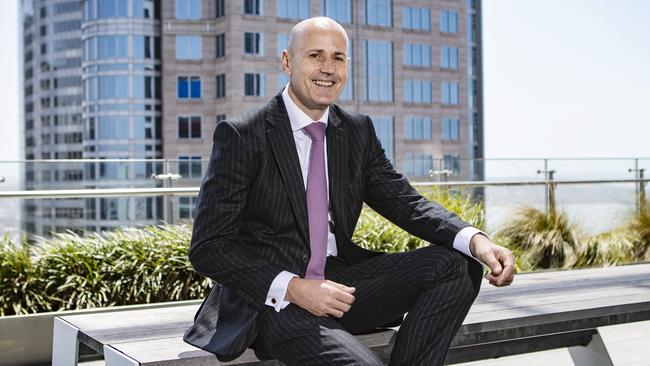
8.10am: Gold hits 7-year peak
Gold soared over 1.5 per cent to its highest in more than seven years as panicked investors scurried towards the safe-haven metal on fears of coronavirus blow to the global economy and US corporate earnings.
Spot gold surpassed the key $US1,700 pivot to touch its highest since December 2012 earlier in the session and was last up 1.7 per cent at $US1,717.36 an ounce.
US gold futures settled 0.5 per cent higher at $US1,761.40, and hit their highest since February 2013 at $US1,769.50.
“US equities are having large fluctuations and people that can’t stomach these kind of moves are continuing to pile into gold,” said Phil Streible, chief market strategist at Blue LineFutures in Chicago.
Reuters
7.50am: Westpac flags earnings hit
Westpac has announced new provisions and writedowns totalling about $1.43bn which it says will reduce first half cash earnings.
It says statutory net profit after tax will also be reduced by the impairments, which anticipate credit losses from the coronavirus pandemic.
It says it plans to update the market before its first half results on May 4.
Westpac says the impact of the items on its CET1 capital ratio is estimated to be around 30 basis points.
Westpac says the items include provisions and costs related to Austrac legal action, increased provisions for customer refunds and a reduction in asset values.
Westpac CEO Peter King said: “Having spent much of the last decade strengthening our
capital we are well placed to respond to the unfolding environment.”
7.47am: Copper near 4-week high
Copper futures prices climbed to their highest in nearly four weeks on supply worries, following a fall in inventories and operations suspension in major producer nations.
The most-traded copper contract on the Shanghai Futures Exchange climbed as much as 1.9 per cent to 41,980 yuan ($US5,958.80) a tonne, its highest since March 17.
The contract closed at 41,850 yuan a tonne, up 1.6 per cent.
Reuters
Patrick Commins 7.40am: Jobless rate tipped to hit 10pc
Treasury analysis of the government’s JobKeeper programs suggests unemployment will peak at 10 per cent, five percentage points lower than would have been the case without the $130bn scheme.
Josh Frydenberg said the government’s historic wage subsidy program “will support millions of Australian jobs as we build a bridge to the other side following the severe economic impact from the coronavirus”.
“The economic shock facing the global economy from the coronavirus is far more significant than what was seen during the global financial crisis over a decade ago,” the Treasurer said.
We were all cruisin’ for a bruisin’
There have now been more than 800,000 applications for the $1500-a-fortnight wage subsidy payment, according to Treasury, or about one-third of all active businesses. The number of applicants, as measured by ABNs, continues to climb each day.
Treasury’s unemployment projections chime with forecasts from the private sector, where the introduction of the JobKeeper program led economists to lower their predictions for the jobless measure from double digits to high single digits.
7.25am: Mixed outlook for ASX
The outlook for Australian stocks remains uncertain after a mixed session on Wall Street overnight, where investors turned their attention to a likely bleak first-quarter reporting season.
Signs of a flattening coronavirus curve in Australia could help the benchmark ASX/200 when it resumes after the Easter break on Tuesday, although The Dow and S&P 500 have fallen after last week’s strong gains.
Amazon.com gains helped the tech-heavy Nasdaq gain ground as US companies prepare for a quarterly earnings season that is expected to be blighted by the coronavirus pandemic.
Oil prices were also mixed as existing demand worries linger following a major production-cut deal inked by global producers.
The SPI200 futures contract rose 0.8 per cent to 5442.0 when it last traded on April 9.
The Australian dollar was buying US63.81 cents at 7am (AEST), up from US62.29 cents at the close of markets on Thursday.
AAP
7.11am: IMF approves debt relief for 25 countries
The International Monetary Fund announced it had approved immediate debt relief for 25 poor countries to help them free up funds to fight the coronavirus pandemic.
“This provides grants to our poorest and most vulnerable members to cover their IMF debt obligations for an initial phase over the next six months and will help them channel more of their scarce financial resources towards vital emergency medical and other relief efforts,” IMF Managing Director Kristalina Georgieva said in a statement.
The countries benefiting are nearly all in Africa, but also include Afghanistan, Yemen and Haiti.
AFP
6.15am: US stocks end mostly lower
The S&P 500 fell, paring some of its gains after its best weekly performance since 1974, as investors looked ahead to the start of corporate earnings season.
US stocks have risen in recent days on optimism that the coronavirus containment measures were working and the economic downturn stemming from the pandemic would be relatively short lived. Caution emerged Monday as some investors grew wary that hard data and quarterly earnings could reveal the extent to which the coronavirus is crimping profits.
This week investors will get insights into how the American financial sector is withstanding the turmoil in the economy when major US banks including JPMorgan Chase, Bank of America and Goldman Sachs Group report. Some blue-chip American companies including Johnson & Johnson are also scheduled to report this week, offering a first look at the impact of social-distancing measures on corporate profits.
The broad stock market index shed about 1pc to start the week. The Dow Jones Industrial Average fell almost 500 points before paring some of those losses to fall 326 points, or 1.4pc at the close. The Nasdaq Composite fell before bouncing into positive territory toward the end of the day, lifted by shares of Amazon.com. The tech-heavy index ended the day up 0.5pc.
Stock benchmarks in Tokyo, Shanghai and Seoul closed lower, while markets in Europe, Australia and Hong Kong remained shut for the Easter holiday.
Australian stocks are tipped to open higher. Shortly before 6am (AEST) the SPI futures index was up 43 points, or 0.8 per cent.
Last week, the S&P 500 climbed 12pc to record its best weekly performance in more than 40 years. Although the index is down about 14pc for the year, it has rallied about 25pc from its March 23 low.
It’s “fear of earnings,” said Nancy Davis, founder of Quadratic Capital Management, of Monday’s move. “We had a spectacular risk-on rally last week.”
The S&P 500’s financials sector underperformed the broader market, falling 3.1pc
Almost 300 companies have withdrawn their financial guidance and about 175 companies have suspended stock buybacks or cut their dividend, according to a Wall Street Journal analysis of the biggest 1500 public companies in the US. A record 17 million people have claimed unemployment benefits as the lockdown spurred a wave of lay-offs and furloughs.
“We think markets are probably not prepared for the weakness in the data and, probably, the duration of the weakness in the data,” said Sameer Samana, senior global market strategist for Wells Fargo Investment Institute.
Oil prices wavered. Brent crude, the global gauge for crude prices, ticked up 0.8pc to $US31.74 after falling earlier in the session. The commodity remains down 52pc this year. Saudi Arabia, Russia and the US agreed to lead a deal to collectively withhold from the market more than 13pc of world production.
In Asian equity markets, Japan’s Nikkei 225 dropped 2.3pc, while South Korea’s Kospi lost 1.9pc and the Shanghai Composite Index slid 0.5pc.
Dow Jones Newswires
6.00am: BHP, Glencore Peru mine on hold
Peru’s Antamina copper mine, controlled by BHP and Glencore, says it will halt all operations for at least two weeks to mitigate against the spread of coronavirus.
The mine had previously been continuing to do essential work in production and maintenance since Peru imposed a countrywide state of emergency in mid-March to prevent the spread of the disease in the country.
The South American country is the world’s no 2 copper producer.
Reuters
5.43am: US crude prices fall
US crude-oil pared an earlier advance and closed lower, a sign of scepticism that global supply cuts will be enough to offset plunging fuel demand.
Crude futures ended the day down 1.5pc at $US22.41 a barrel on the New York Mercantile Exchange in volatile trading. While they have rebounded from a recent 18-year low, prices have still crashed 63pc this year, with the coronavirus pandemic stalling global travel and crunching fuel consumption around the world. Brent crude, the global gauge of oil prices, ended the day up 0.8pc at $US31.74 a barrel on the Intercontinental Exchange.
Monday’s swings came after 23 countries led by Saudi Arabia, Russia and the U.S. agreed over the weekend to withhold 9.7 million barrels a day of oil from global markets. The deal came after President Trump intervened to help resolve a clash between Saudi Arabia and Mexico that threatened to jeopardise the historic agreement. The U.S. has never been so critical to such a global supply accord.
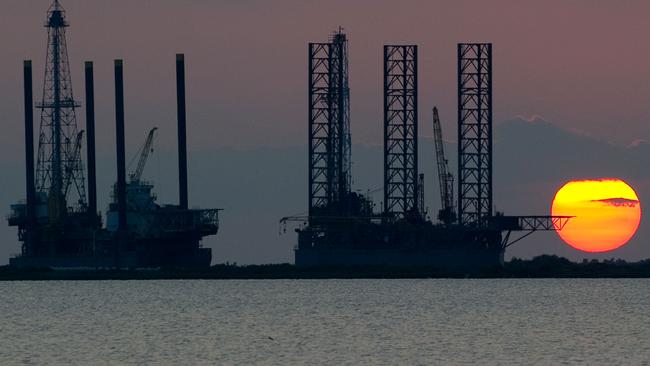
Mr. Trump said on Twitter Monday that OPEC and allies are actually working to remove 20 million barrels a day of supply from global markets, rather than the 10 million barrels-a-day figure “that is generally being reported.” OPEC officially announced the supply cuts would be 9.7 million barrels a day Sunday but said in a draft press release that the deal and other production outages could end up withholding 20 million barrels a day of supplies from the market.
While the deal puts an end to a weeks-long conflict between Saudi Arabia and Russia that was increasing supply as demand tumbled, analysts said it still doesn’t come close to matching the drop in fuel consumption. Estimates for the loss in global oil demand continue rising into the tens of millions of barrels a day, with some approximations now between 25 million and 35 million barrels a day.
Dow Jones
5.35am: eBay has new CEO
Struggling online retail giant eBay named a new top executive, bringing in the former head of e-commerce at Walmart, Jamie Iannone.
Iannone will take over April 27 from interim CEO Scott Schenkel, who took over after Devin Wenig stepped down last year.
Most recently Iannone was chief operating officer of Walmart eCommerce and has some 20 years of experience in retail and digital operations, according to an eBay statement.
Iannone worked previously at eBay for eight years and also was an executive at bookseller Barnes & Noble.
AFP
5.30am: Oil cut bigger than reported: Trump
Top global oil producers are considering slashing output by 20 million barrels a day under the terms of a deal to boost prices, US President Donald Trump said.
Trump’s tweet came after OPEC producers and their allies agreed on Sunday to cut production by 9.7 million barrels per day. which some analysts feared would not be enough to stem the damage from the combination of plunging demand amid the coronavirus pandemic and a price war between Russia and Saudi Arabia.
“Having been involved in the negotiations, to put it mildly, the number that OPEC+ is looking to cut is 20 Million Barrels a day, not the 10 Million that is generally being reported,” Trump tweeted.
“Thank you to all of those who worked with me on getting this very big business back on track, in particular Russia and Saudi Arabia.”
The US benchmark WTI oil price climbed 1.4 per cent in New York after Trump’s tweet to $US23.10, while Brent rose 0.9 per cent to $US31.76.
OPEC members dominated by Saudi Arabia and other producers led by Russia have been negotiating a deal to cut production and support prices for days.
AFP
5.25am: Fed ‘can protect US from deflation’
The Federal Reserve can stop deflation from striking the US economy, which already has been badly affected by the coronavirus the central bank’s vice chair said.
Inflation had been lingering for years below the Fed’s two-per cent goal, and with the pandemic’s impact on normal activity, prices could fall.
Demand has been impacted “very adversely,” Richard Clarida said in an interview on Bloomberg TV, calling the effects “disinflationary.” “I think we have the tools to keep the US economy out of deflation and to support the economy through this challenging period,” Clarida said.
The Fed has deployed unprecedented emergency efforts to shore up the financial system including pumping trillions of dollars of liquidity into the once-healthy economy that’s been turned upside down by the virus, and supporting lending to households and companies.
Businesses nationwide have closed to stop the spread of COVID-19, while demand has dropped as consumers have stayed home, leading to about 17 million people losing their jobs as of mid-March.
AFP
5.20am: MMG drops copper mine guidance
Australia-based MMG Ltd is formally withdrawing its 2020 production guidance for the Las Bambas copper mine in Peru, it says, after the South American country extended a state of emergency to contain the spread of coronavirus.
The miner, which is majority owned by state-run China Minmetals Corp, said in a filing to the Hong Kong stock exchange that Las Bambas would continue to operate at reduced levels, but did not provide a new full-year output forecast. Las Bambas, one of the world’s biggest copper mines, is one of a string of major mining projects to curb production in the wake of the pandemic, which has killed more than 100,000 people worldwide.
However, any resulting supply tightness could be cancelled out by a collapse in metals demand.
MMG had on March 4 guided for production of 350,000-370,000 tonnes of copper in concentrate at Las Bambas this year – nearly 2 per cent of the world’s projected mine supply for 2020 – before saying on March 19 it had temporarily reduced operations at the mine due to the initial state of emergency. Reuters reported last Thursday that MMG had declared force majeure – a clause invoked when companies cannot meet contractual obligations due to circumstances beyond their control – on concentrate shipments from Las Bambas after Peru extended its state of emergency to April 26.
Elsewhere, MMG said its operations have largely continued as normal at its mines in Australia and the Democratic Republic of Congo, where the company “at this stage continues to maintain existing 2020 guidance”.
Reuters
5.15am: SoftBank forecasts $US7bn loss
Struggling Japanese conglomerate SoftBank Group has forecast a $US7 billion net loss for the year ended March due to the negative impact of coronavirus and losses related to WeWork.
The telecoms and investment giant, led by flamboyant entrepreneur Masayoshi Son, said in a surprise press release it also expected to suffer an operating loss of 1.35 trillion yen or $US12.5 billion.
The firm cited a 1.8- trillion yen loss at its SoftBank Vision Fund, blaming “the deteriorating market environment” in the wake of the global coronavirus pandemic.
Under Son’s leadership SoftBank Group has morphed into an investment and technology firm, and its $US100 billion Vision Fund has taken stakes in some of Silicon Valley’s hottest start-ups.
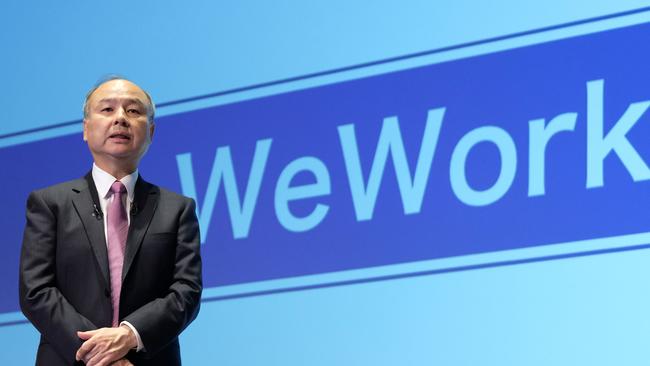
AFP

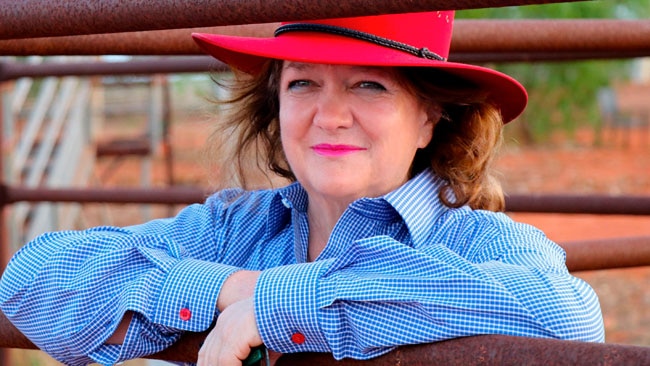

To join the conversation, please log in. Don't have an account? Register
Join the conversation, you are commenting as Logout